|
40 Bank Street (Elwick Road 1881 ) )
Ashford
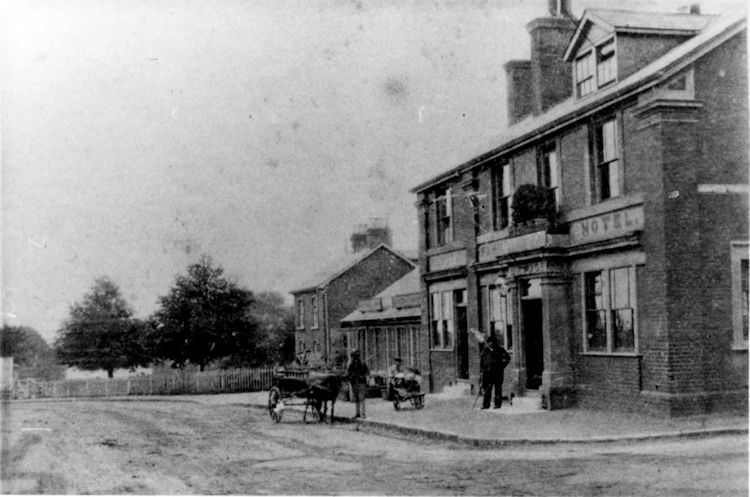
Above photo, date unknown. |
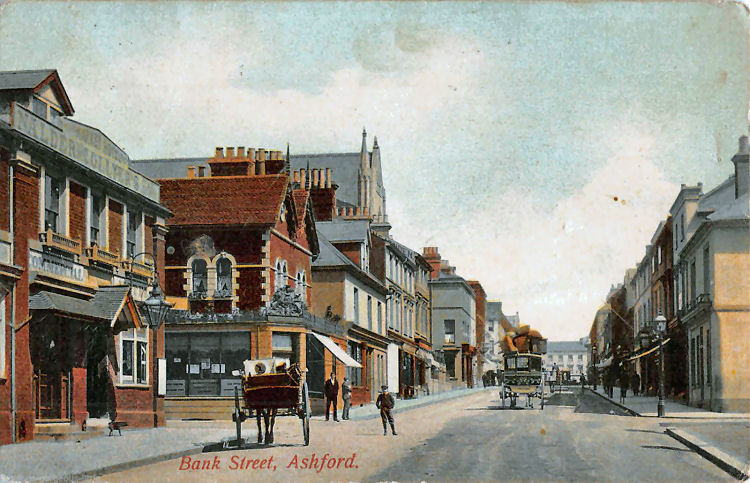
Above postcard, circa 1900. Kindly sent by Rory Kehoe. |
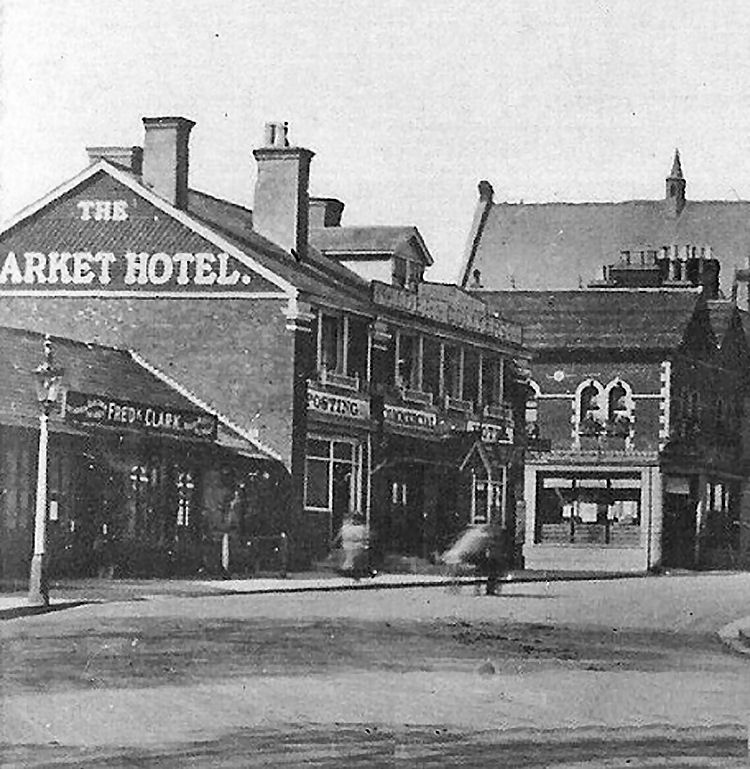
Above photo, circa 1900. Kindly sent by Rory Kehoe. |

Above postcard, showing full area, circa 1900. |
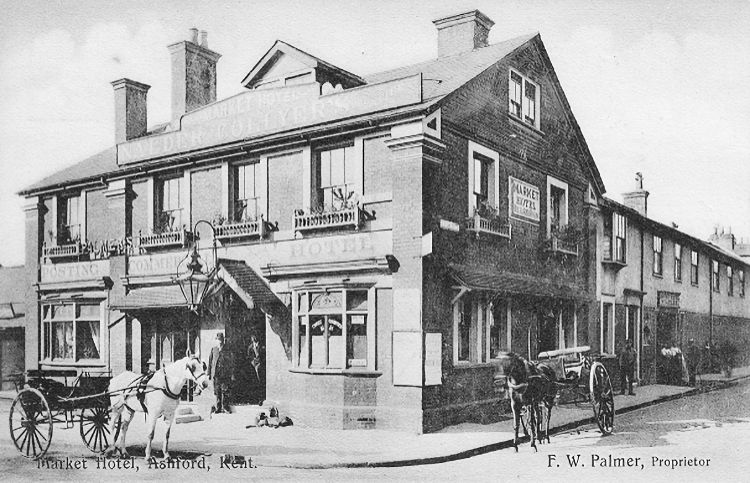
Above photo, circa 1902. |
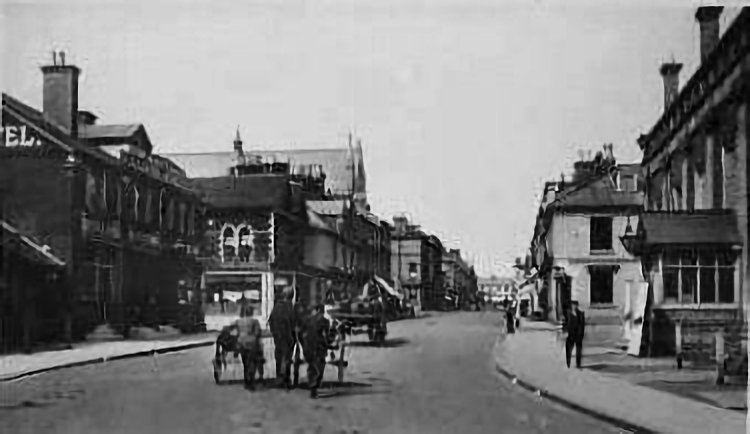
Above photo, date unknown, kindly sent by Christopher Green. |
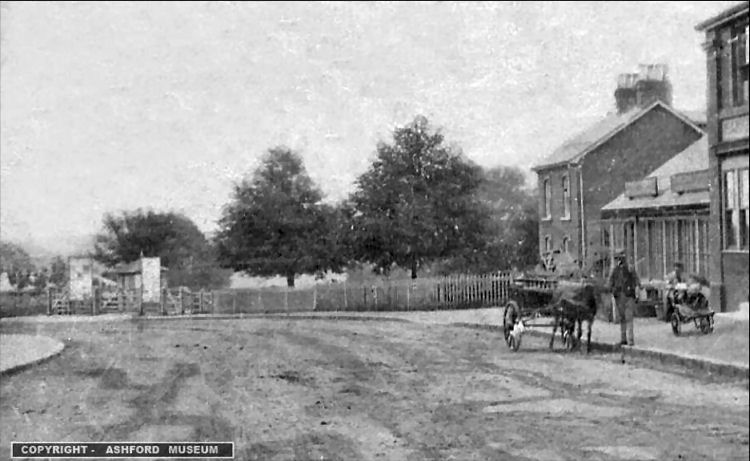
Above photo, date unknown, by kind permission Roy Moore,
http://www.kentphotoarchive.com. |
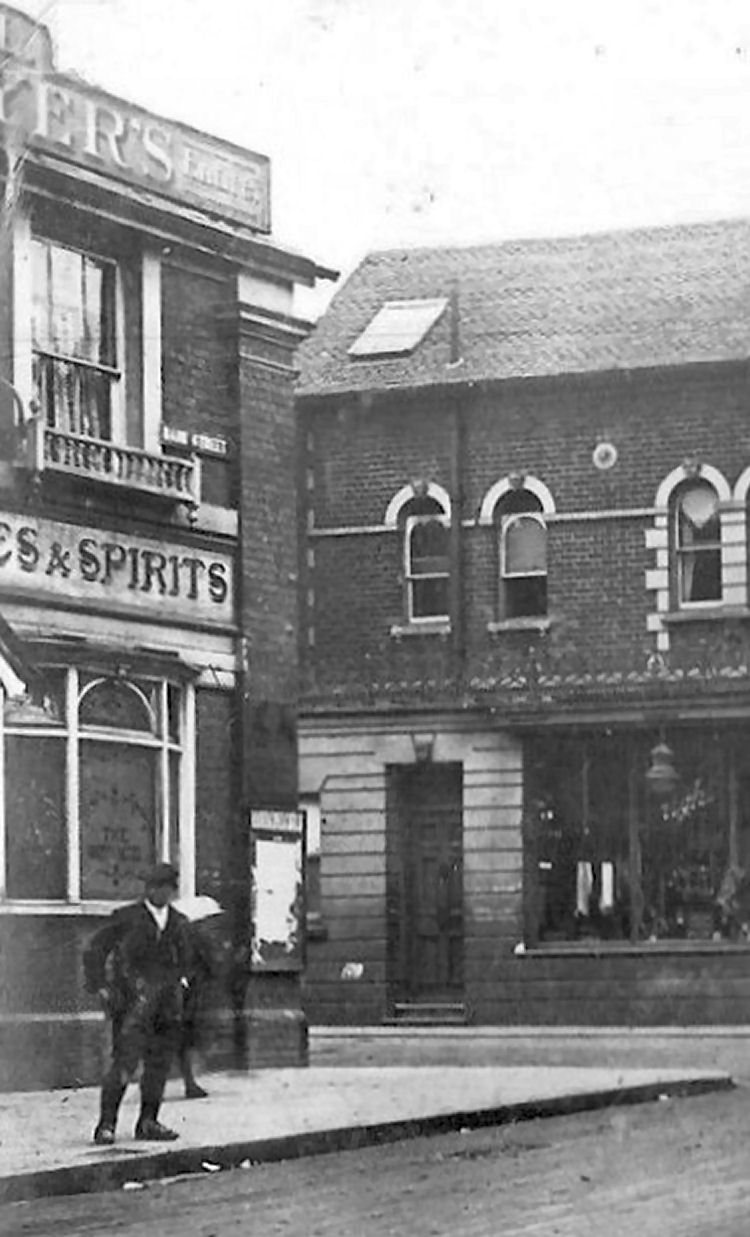
Above photo, circa 1912, kindly sent by Rory Kehoe. |
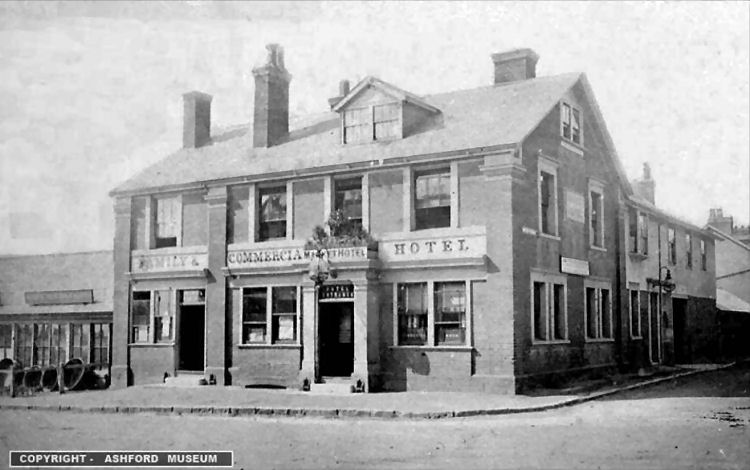
Above photo, date unknown, by kind permission Roy Moore,
http://www.kentphotoarchive.com. |

Above photo date unknown. |

Above postcard, date unknown. |
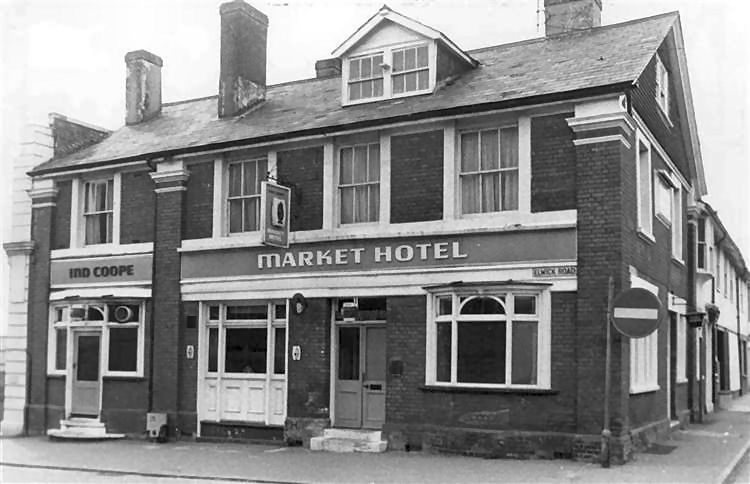
Above photo 1975 by Mike Bennett. |

Above photo, 15 June 1975, by Jim Ashby.. |
Opened in 1858 this part time pub traded on market days, when the auction mart
and corn exchange was operating in the area.
The pub was at one time supplied by Nalder & Collyer, which was a Croydon-based
company. Miles away!
Nalder and Collyer sold out to the City of London brewery in 1919, got
closed in 1936 and their pubs were sold on to Ind Coope, which is how the
Market Inn became an Allied Breweries outlet.
Late 70s/early 80s when Pete Smith, licensee of the Royal Dragoon,
had the licence for the Market Inn. It sold Shepherd Neame.
|
South Eastern Gazette, 7 February, 1860.
The Notorious Dutchman at Ashford.
At the police court, on Tuesday, before W. Burra, Esq., an elderly
and very respectable-looking man, who gave the name of Van de
Walter, but who has a number of aliases, was charged with defrauding
Mr. Bridge, of the "Market Inn," to the amount of upwards of £4.
Supt. Dewar said that, from papers he had in his possession, it
appeared that prisoner came to England in 1843, when he passed by
the name of Dr. Wolff. His career in this country had been marked by
a succession of swindles, and notices of his conduct and
descriptions of his person had been frequently published in the
newspapers. He (the Superintendent) held information that in 1858 he
absconded from an hotel at Grantham, after contracting a debt to the
amount of £60 by representing himself to be a gentleman of property;
he was afterwards guilty of the same conduct at Leicester, where he
left a debt of £61; then at Derby, where he victimised an
hotelkeeper to the amount of £28; he was then found at Canterbury,
where, upon his representation that he was a gentleman of fortune
with money coming in February, his promissory note was taken for a
debt he ran up there; but from what subsequently transpired, he
suddenly quitted that place also. He afterwards came to the "Market
Inn," Ashford, where, upon the faith of his representations, he had
been allowed to contract debt of £4 5s. for board and lodging. He
had represented that his luggage was left at Derby, and upon a
message being sent the superintendent of that place came up, and
identified him as the man who had swindled the hotel at that place,
by a likeness of himself, which he had left behind. There was,
however, nothing else there belonging to the prisoner besides an old
coat.
Mr. W. Bridge deposed:— The prisoner came to my house in the evening
six weeks ago, had some tea, and afterwards went to bed, for which
he paid the next morning. He has remained in my house ever since,
and continued to pay every day for what he had until the 4th of
January. He then said he should like to bargain for a month, as he
was short of money just then, but had plenty coming to him early in
February; he being a man of large property abroad — in mining
shares, and money in foreign funds — the dividends upon which would
then become due. He also showed a quantity of stones in a paper,
which he said were diamonds, some cut, and some in the rough state.
I asked him to allow me to take them to show some one in the town
who would acquaint me of their value; but he would not; he said he
would only leave them with me if they were sealed up and locked in a
drawer. He said he had left all his luggage and books at the "Royal
Hotel," Derby. He stayed till his bill amounted to £4 5s. A
gentleman who came to my house, remarked to me, "Why, you have got
that man who goes about swindling public-houses," and upon that I
gave him into custody. I should not have let him had the board and
lodging but upon the representations that he made.
Prisoner:— The diamonds were not offered you as security for the
debt; but to show you that I did not intend to run away without
paying. I still believe that they are diamonds, and I did not like
to let them go because I knew no jeweller could tell their value.
Supt. Dewar deposed that he apprehended the prisoner on Saturday,
and asked him if he had any diamonds. He replied, No, he had not.
Witness found in prisoner’s leather bag the stones produced. After
prisoner got to the lock-up, witness asked if prisoner was any
profession. He said, No, he had been reduced to his present
circumstances for the last two years through the fraud of his
brother-in-law, for whom he was bound for £10,000. Witness found all
the letters and papers produced in prisoner’s bag. (Among these was
a letter from a solicitor in London relative to an offer by prisoner
to sell a project of his invention for £100; another was relative to
selling a process by which prisoner proposed to convert crystals
into diamonds). The property he possessed besides was an old shirt.
Mr. Edward Hayward, jeweller, proved that the stones were of no
value whatever.
The prisoner made a very long defence, to the effect that he came to
stay at a small inn in a small town in order to make his funds go as
far as possible till he received his money in February. He lived at
Mr. Bridge’s only in a very moderate way-having but one meal a day
and a glass of rum at bed time, for which he regularly paid. Being
on friendly terms at last with Mr. Bridge, he asked if he could have
credit till February, intending, if he could not, to have gone away
at once; although he should have regretted this, as he was very
comfortable indeed, he had lived at many first-class hotels, where
the accommodation was not so good as that provided by Mr. Bridge. As
he could not pay, Mrs. Bridge asked for some security, and she then
suggested that he should leave the diamonds with them. She wanted to
have them valued, and this he would not allow, as they were
specimens from a new mine in the Brazils entrusted to him to have
tested. This made him cross, and gave rise to his apprehension.
Mr. Burra said that, as far as the offer of the diamonds went, there
was a fraud; but at the same time innkeepers should have the same
caution as other tradesmen in trusting strangers without luggage. He
thought if the case was gone on with, the parties from Derby and
Canterbury should attend and give evidence.
Superintendent Dewar said they had offered to do so, and the case
was accordingly remanded for that purpose.
|
|
From the Maidstone Telegraph, Rochester and Chatham Gazette,
11 February, 1860.
THE NOTORIOUS DUTCHMAN AT ASHFORD
At the police court, on Tuesday, before W. Rurra, Esq., and elderly
and very respectable-looking man, who gave the name of Van de Walter,
but who has a number of aliases, was charged with defrauding Mr. Bridge,
of the "Market Inn," to the amount of upwards of £4.
Remanded.
|
|
South Eastern Gazette, 14 February, 1860.
The Swindling Dutchman.
At the remanded examination of Van de Walter (but who has also a
string of aliases) on a charge of defrauding Mr. W. Bridge, of the
"Market Hotel," a good deal of evidence was brought forward a as to
the prisoner’s career of swindling previous to his a making his
appearance at Ashford.
Mr. Henry Cantril, son of the proprietress of the "Royal Hotel,"
Derby, said the prisoner came to his mother’s hotel in August, and
after staying two or three days paid his bill. He then intimated
that he should like to come to some terms for his accommodation. In
the course of his stay he informed witness that he was bringing out
a book on chemistry. After remaining about three months he left,
without paying his account, which was about £28; and witness had not
seen him since till the present time.
Mr. George Hilton, superintendent of police at Derby, said:— In
consequence of a communication I received I came to Ashford on
Saturday last, and went in search of the prisoner, whom I found in
the "Mechanics’" Reading Room. I told him I had come from Mr.
Bowyer, Leicester, and the "Royal Hotel," Derby, and was
commissioned to make arrangements with him, if he could make any of
a satisfactory character. He said, "I shall pay them when my money
comes from Amsterdam."
I said, "I am commissioned to telegraph to any respectable person,
whom you may know there." He then said, "I had property there, but I
became security for my brother for £10,000; he has run away, and I
am ruined." He added that he had not had dinner for two days, and no
breakfast that morning, and that he had not a farthing in the world.
I said, "How did you get, from the "Royal Hotel," Derby, when
everybody was looking after, you?"
He replied, "I had £19 which a gentleman gave me; Mr. Bowyer came
from Leicester, and others came and demanded money of me, and I knew
that if I gave it to any one of them I should be destitute, and
locked up in prison, and then could not get away; so I went
upstairs, and recollecting there were some back stairs, I went down
and got into the street unobserved."
But I added, "How did you leave the town when we were watching for
you at the station?"
"O," he replied, "I took a cab and went to the next station."
After he had gone from Mr. Bowyer’s, at Leicester, it was found that
he had taken his things away by small quantities, and left an empty
trunk.
Mr. James Venables, of the "Mitre Hotel," Oxford, said the prisoner
came to his house on the 7th of October, 1858, and when he left owed
a bill of £68 17s. 6d. At first he paid a small bill or two. While
he was at Oxford he was introduced to the best society, and stated
that he was bringing out an invention in connection with gas. One
Saturday he left, and as he did not come back in the evening,
suspicion was aroused, and it was found that he had left behind him
two empty boxes, which were upstairs.
Mr. Joseph Strangfield, surgeon, Weston-super-Mare, Somersetshire,
stated that he knew the prisoner some years ago, as Dr. Wolf, when
the latter was staying at an hotel at Weston. The prisoner was
introduced to him as a literary man, and a great linguist, and they
became acquainted. Having some shares in the Hague Gas Company, and
the prisoner being a Dutchman, the witness was induced to ask him if
he was acquainted with the company, and knew anything of its
position. The prisoner then induced him to part with fifteen of the
shares to himself that he might ascertain their value, but he did
commission him to sell them. After a considerable lapse of time
during which he had lost sight of the prisoner, he received a
communication from Mr. Goldsandt, a Hague broker who advised him to
sell the shares at par. He never heard anything of the prisoner
after he left Weston until he received a communication in reference
to him from Mr. Venables, of Oxford. With considerable difficulty he
traced thirteen of the shares, ten of which he obtained back again,
and found that the prisoner had sold three, which were worth £20
each at par, but, could gain no information with reference to the
remaining two.
Prisoner questioned Mr. Strangfleld, with a view of showing that he
had given him ten of the shares back, and that they were all
valueless, but Mr. Strangfleld said that his assertions were totally
untrue.
This being the whole of the evidence against the prisoner, the
Chairman said he thought the charge of obtaining goods under false
pretences had not been substantiated; he had not obtained goods by
means of false pretences, but made the fraudulent representations
because he was not able to pay the bills.
Superintendent Hilton said that he had discovered that the prisoner
victimised hotel keepers in Yorkshire in a similar manner ten years
ago; he had also traced him to Chester and Grantham.
The Chairman:— If the sale of the shares can be proved against him
there is no doubt of a conviction.
Prisoner:— I think, when I am a little more composed, I can answer
every case. The truth is this, Mr. Chairman, that I am ruined by my
brother-in-law, who ran away with the money for which I was
security. Before that I had been living in very good circumstances.
Then I became very poor, and I have tried by my knowledge to make
some money, and I came for that purpose into England. I have several
inventions, which I have made useful to me, and made money with
them; but that would not always succeed, and then I have been
reduced, and been almost a pauper. Then I have made money again, and
paid what I owed. I am now getting old, and my energies and
faculties have not always been successful. Still, I was on the point
of being successful in Derby, if that Mr. Bowyer had not interrupted
me and driven me away. But wherever I have been I have paid as much
as I could. Now, the man that pays whenever he can is not exactly a
swindler. As far as this case goes, it is a trumpery case. To me
these shares were worth nothing; they had not paid any interest for
the last ten years or more, and it was only from friendship that I
charged myself with ascertaining what they were worth.
The prisoner was then formally charged with having committed a
misdemeanour, in applying the shares to his own use, and on this
charge he was ordered to be detained, and, for the convenience of
the witnesses, transferred to Somersetshire.
|
|
From the Maidstone Telegraph, Rochester and Chatham Gazette, 18 February, 1860.
ASHFORD THE SWINDLING DUTCHMAN
At the remanded examination of Van de Walter (but who has also a string
of aliases) on a charge of defrauding Mr. W. Bridge, of the “Market
Hotel,” a good deal of evidence was brought forward as to the prisoner's
swindling career previous to his making an appearance at Ashford.
Mr. Henry Cantril, son of the proprietress of the “Royal Hotel,” Derby;
Mr. George Hilton, Superintendent of police at Derby; Mr. James Venables,
of the “Mitre Hotel,” Oxford; and Mr. Joseph Strangfield, surgeon,
Weston-super-Mare, Somersetshire, having given evidence for the
prosecution, prisoner questioned Mr. Strandfield, with a view of showing
that he had given him ten of the shares back, and that they were all
valueless, but Mr. Strangfield said that his assertions were totally
untrue. This being the whole of the evidence against the prisoner.
The Chairman said he thought the charge of obtaining goods under false
pretences had not been substantiated; he had not obtained goods by means
of false pretence, but made the fraudulent representations because he
was not able to pay the bills.
Superintendent Hilton said that he had discovered that the prisoner
victimised hotel keepers in Yorkshire in a similar manner ten years ago;
he had also traced him to Chester and Grantham.
The Chairman:- If the sale of shares can be proved against him there is
no doubt of a conviction.
Prisoner:- I think, when I am a little more composed, I can answer every
case. The truth is this, Mr. Chairman, that I am ruined by my
brother-in-law, who ran away with the money for which I was security.
Before that I had been living in very good circumstances. Then I became
very poor, and I have tried to my knowledge to make some money, and I
came for that purpose into England. I have several inventions, which I
have made useful to me, and made money with them; but that would not
always succeed, and then I have been reduced, and been almost a pauper.
Then I have made money again, and paid what I owed. I am now getting
old, and my energies and faculties have not always been successful.
Still, I was on the point of being successful in Derby, if that Mr.
Bowyer had not interrupted me, and driven me away. But wherever I have
been I have paid as much as I could. Now, the man that pays whenever he
can is not exactly a swindler. As far as this case goes, it is a
trumpery case. To me these shares were worth nothing; they had not paid
any interest for the last ten years, or more, and it was only from
friendship that I charged myself with ascertaining what they were worth.
The prisoner was then formally charged with having committed a
misdemeanour, in applying the shares ton his own use, and on this charge
he was ordered to be detained, and, for the convenience of the witnesses
transferred to Somersetshire.
|
|
South Eastern Gazette, 6 March, 1860.
The Swindling Dutchman.
Van de Walter, otherwise Dr. Wolf, and a number of other aliases,
the Dutchman who was examined before the Ashford magistrates on a
charge of swindling Mr. Bridge, of the "Market Inn," and several
other hotel keepers, and who was remanded to Weston-super-mare, in
order that a charge of fraudulently disposing of some shares in the
Hague gas company, entrusted to him by Dr. Joseph Strangfield, of
that place, might be further investigated by the magistrates there,
has been committed for trial at the next Old Bailey sessions.
|
|
From the Maidstone Telegraph, Rochester and Chatham Gazette, Saturday 10 March, 1860. Price 1d.
ASHFORD
Van de Walter, the Swindling Dutchman, otherwise Dr. Wolf, and a number
of other aliases, the Dutchman who was examined before the Ashford
magistrates, on a charge of swindling Mr. Bridge, of the “Market Inn”,
and several other hotel keepers, and who was remanded at
Weston-Super-Mare, in order that a charge of fraudulently disposing of
some shares in the Hague gas company, of that place, might be further
investigated by the magistrates there, has been committed for trial at
the next Old Bailey sessions. |
|
From the Maidstone Telegraph, Rochester and Chatham Gazette, Saturday 31 March, 1860. Price 1d.
THE NOTORIOUS DUTCHMAN
The foreigner who under the name of van de Walter swindled Mr. Bridge,
of the “Market Inn,” out of several weeks' board and lodging, after
practising upon several hotel keepers in Leicester, Derby, and
elsewhere, has escaped justice after all. He was committed by the
magistrates of Weston-Super-Mare for trial at the Central Criminal
Court, for fraudently disposing of Dr. Strangfield's shares; but in
consequence of some mistake, neither the prosecutor, prisoner, not
witnesses were in time for the sitting, and therefore the prisoner was
discharged. |
|
From the Whitstable Times and Herne Bay Herald, 23 June 1860.
ASHFORD THE FOUR O'CLOCK MOVEMENT.
A numerously attended meeting of the building operatives in Ashford was
held at the "Market Inn," on Wednesday in Ashford when a petition was
drawn up to be sent to each employer in the town and neighbourhood
requesting that the system of leaving work at four o'clock on Saturdays
might be adopted in Ashford. A second meeting is to be held on Wednesday
next. See "Rose
and Crown," Maidstone. |
|
South Eastern Gazette, 10 July, 1860.
East Kent Quarter Sessions.
These Sessions were held on Tuesday last, before J. B. Wildman,
Esq., chairman.
Francis Warner was indicted for having stolen 18s. from the person
of John Weller, at Ashford, on the 13th of June. Mr. Russell
prosecuted.
Prosecutor deposed that on the above day he went to the "Market Inn"
with the prisoner. While there he felt something in his pocket, and
then saw the prisoner’s hand pass to her pocket. He then missed two
half-crowns. The prisoner took all his money to count it for him,
but kept 13s., and went off with it. He gave information to the
police, and afterwards saw her in the street. She said she had got
his money all right, and if he would go with her, she would give it
to him. He went with her, but could not get his money.
Six months’ hard labour.
|
|
From the Kentish Chronicle, 26 January, 1861.
ASHFORD PETTY SESSIONS. AN"EXCITED LOVER"
(Before G. E. Sayer, Esq., and Captain Groves.)
Thomas Convin, an engineer, was charged with creating a disturbance and
breaking a window at the "Market Inn," on the previous Sunday.
Mr. Bridge, the landlord, stated that the prisoner came to his house
about one o'clock on the above day, with a return ticket from Brighton,
and had some dinner. Witness went out about three o’clock, and on his
return he found the prisoner very much excited, and threatening that he
would get a revolver the next time he came, and murder every one in the
house; and as to the barmaid, as sure as he met her there would be
bloodshed. His conduct was so intolerable that he was put out of the
house; but he returned again three times, and on the last occasion he
broke the glass and ran towards the station. He had only two glasses of
stout in the house.
Thomas Smith and George Potter corroborated this evidence, stating that
the prisoner threatened to take their lives also.
The prisoner said that he had been working at Mr. Foord’s engine factory
at Ashford, and while there proposed and was accepted by a young person
living in Mr. Bridge's house. Something unpleasant occurred, and he
obtained a good situation at Brighton, and from thence wrote many
letters, both to Mr. Bridge and to the object of his affections, with
the view of making matters up. These, however, proved unavailing, and he
therefore came himself; but as this was attended with no better success
he became excited in the manner that had been stated, for which he was
now very sorry, and if the offence were looked over he would go away and
never come back again.
Mr Bridge said that the young person mentioned was the daughter of
highly-respectable parents, and denied that there had ever been any
engagement between her and the prisoner.
The Bench fined him 4s. 9d. for the damage, and 20s. fine.
|
|
Maidstone Telegraph, Saturday 8 February 1868.
ASHFORD. Petty Sessions, Saturday.
Before G. E. Sayer, Esq., chairman, Lient.-Colonel Groves, R. H.
Knatchbull-Hugessen, Esq., M.P., H. Tufton, and P. D. N. Oxenden, Esqs.
How Mrs. Woodgate Lost Her Bag.
A respectably-dressed woman belonging to Ham-street attended to
prosecute a pensioner named Horace Finn, living in Ashford, for stealing
from her a reticule bag containing some bread and cheese, a bottle of
medicine, and 5d in copper. It appeared from the evidence that Mrs.
Woodgate came up to Ashford on the previous market day, and towards
evening she went into the "Market Inn," having had, as she admitted
"something to drink." The barmaid, however, thought from her condition
she did not stand in need of any beverage of an alcoholic nature, and
declined to serve her with anything stronger than a glass of water. Mrs.
Woodgate accordingly partook of a bumper of the limpid element. Being,
however, in a generous frame of mind, she treated every one else who
happened to be near her to stronger potations. She passed once or twice
between an inner room and the bar, and on one occasion left her hag
behind her. The prisoner brought it to her, and she thanked him. Soon
afterwards she started to go to the railway station, and according to
the statement of the prisoner and other persons she asked Finn to
accompany her and to carry her bag. She herself denies that she did so.
In was certain, however, that her funds by this time were running low,
as she complained of having out 2d left to pay her fare. Finn, not to be
outdone in the generosity which she had shown, said that "if no one else
would pay her fare he would." At the station they became separated, and
Finn not being able to find her again took the bag home and hung it up.
Mrs. Woodgate in the mean time began to think she had been robbed, and
went from the railway station to the police station and made her
complaint. Supt. Dewar advised her to go home and consult with her
husband before she gave any one in charge. The husband, the day after he
had heard his wife's story, communicated with Police-sergeant Smith, and
that officer immediately proceeded to Ashford and found the bag hung up
in Finns house. There was no concealment of it in any way, and the
bottle of medicine still remained in it. The Bench, without hearing
Finn's witnesses, dismissed the case.
|
|
From the Whitstable Times, 29 June, 1901.
ASHFORD USING TREATS TO AN HOTEL KEEPER.
At the Ashford police court on Friday, Daniel George Swaffer, of
Ashford, was charged with using threats to William Francis Palmer,
landlord of the "Market Hotel." On the previous day prisoner said he
would "stick something into” prosecutor, besides using other threats. He
was ordered to find sureties to keep the peace for six months, himself
in £5 and two of £10 each; or, in default, a month's imprisonment.
|
The pub changed name to the "Wig and
Gavel," as yet date unknown.
LICENSEE LIST
BRIDGE Mr 1860-62+

BRAHAM George 1874+
PATCHING James 1881-82+ (age 44 in 1881 ) )
DAVIDSON Alexander A 1891+ (age 28 in 1891 ) )
PALMER William Francis 1901-30+ (age 45 in 1930 ) )

BLAKE Edward Porcher 1938+
SMITH Peter late 1970s-early 80s
https://pubwiki.co.uk/MarketInn.shtml
http://www.closedpubs.co.uk/markethotel.html
 From the Kelly's Directory 1903 From the Kelly's Directory 1903
 Census Census
 Kentish
Chronicle Kentish
Chronicle
|












